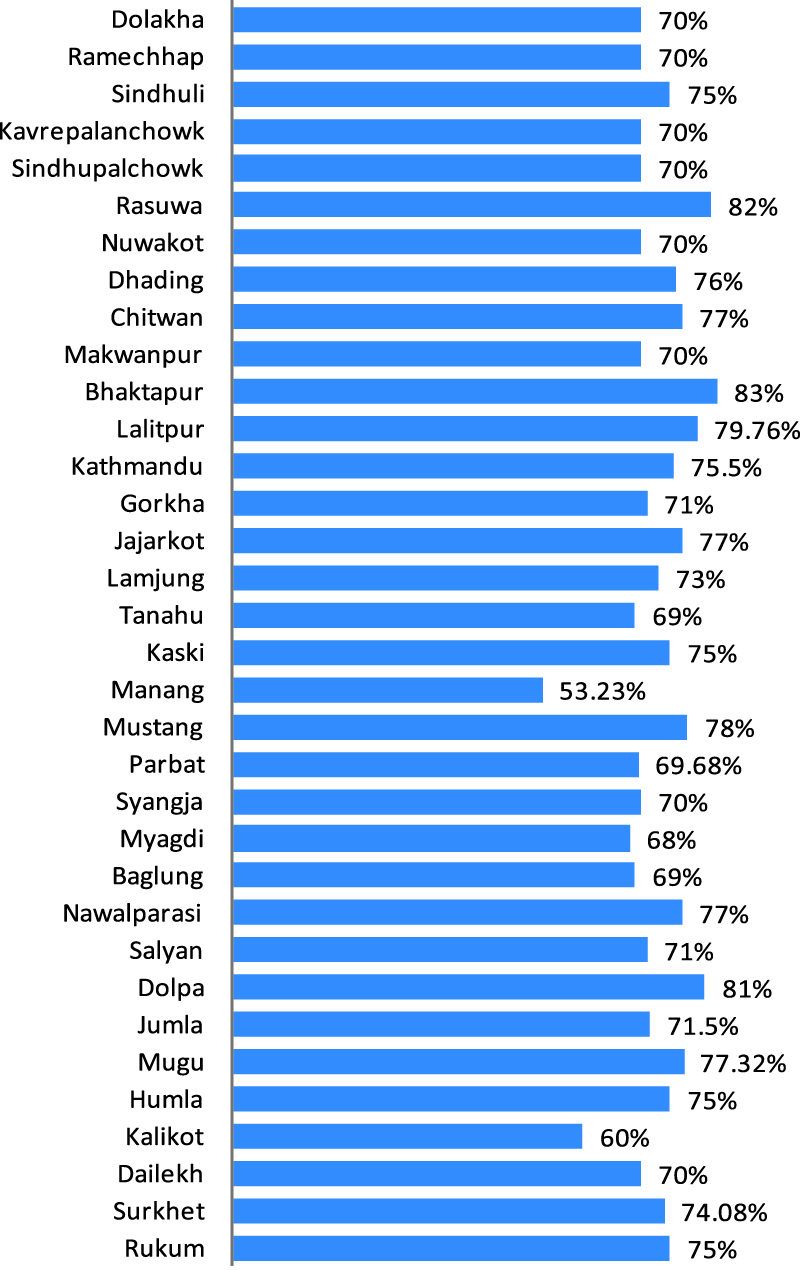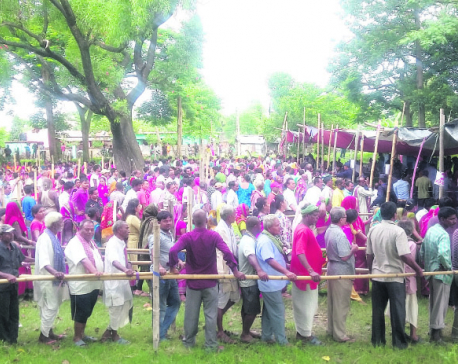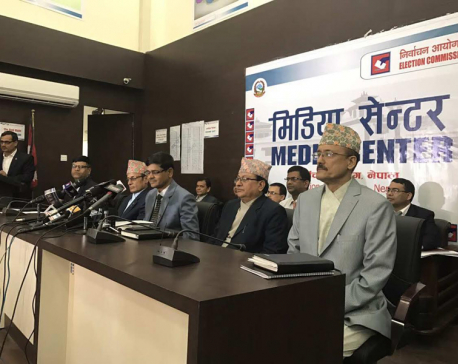
OR

KATHMANDU, May 14: Nepal on Sunday conducted the first round of elections in the 281 local units of three provinces, bringing out millions of first-time local-election voters to the polling centers. The local polls, held after a gap of 20 years, were peaceful.
The local election, which is considered a serious test for the implementation of the new constitution, witnessed a huge voter turnout. The Election Commission citing ‘preliminary reports’ collected from the 34 districts in the three provinces till 10 pm said voter turnout was 73 percent.
“Voters lined up before 7 am and the level of participation by senior citizen, the disabled, the visually impaired and even those observing death rituals was encouraging,” Chief Election Commissioner Ayodhee Prasad Yadav told reporters gathered at EC headquarters after the voting was over.
The voter turnout is slightly less than in the 2013 Constituent Assembly elections, when 79 percent of voters had appeared at the polling centers.
According to EC officials, candidates in two local units-Narphu of Manang district and Shey Phoksundo of Dolpa- were elected unopposed. The EC has cancelled the voting at three polling centers following clashes among the contesting parties. They include polling centers at Namobuddha Municipality in Kavre district, Melung Rural Municipality in Dolakha and Kalika Rural Municipality of Kalikot.
The EC will hold elections in these polling centers after consultations with the political parties. Voting in Dolakha was cancelled after a youth died when police opened fire during a clash between cadres of the ruling Nepali Congress and main opposition CPN-UML.
Polling officers remained busy till late evening transporting ballot boxes to the headquarters of local units . Helicopters are transporting ballot boxes from the mountain districts and four wheelers or poll workers have been mobilized in the other districts to bring in the ballot boxes prior to counting the votes.
“Chief returning officers and returning officers will fix the time for vote counting after coordinating with the political parties. On completion of their own preparations, the returning officers will begin counting the votes right from tonight or tomorrow morning,” said CEC Yadav.
Vote counting will take place at the headquarters of the local units, according to Yadav.
Encouraged by the success of the first round local elections, election commissioners said this will help make the second round a success also.
Since the new local election law has gender-friendly and other helpful provisions, significant numbers of youths, women, Dalits and people from the marginalized communities are contesting the elections.
Altogether 49,337 candidates contested the elections held for 13,556 posts in the 283 local units. The new election law has ensured greater participation of Dalit and marginalized communities in local governance. The total number of women candidates stands at 19,322 while the male candidates number 30,005.
“I was really excited at this opportunity to elect my own government. And it will work for change,” said Kabita Rai, an LLB student, after casting her vote at a polling center at Baneshwar.
Local bodies have been running without elected people’s representatives since 2002 when then prime minister Sher BahadurDeuba neither held local body elections nor extended the terms of the existing people’s representatives. Elected in 1997, their five-year terms expired at a time when the Maoist insurgency was climaxing. The insurgency, which claimed the lives of 17,000 people, ended after the signing of a peace agreement with the then Seven Party Alliance.
After the election of their leadership the local units will formulate laws on their own and collect revenue to run the local government. Another 461 local units are yet to elect their leadership.
The EC has set June 14 as the poll date for electing the representatives of the remaining local units.
Election peaceful: Poll observers, experts
Poll observers and election experts have welcomed the local election. They said the election remained largely peaceful although voters experienced some difficulties in voting. “Large-size ballot papers, inadequate voter education and multiple symbols caused confusion among voters,” said Democracy and Election Concern Nepal General Secretary Mukti Rijal.
General Secretary Rijal said the number of invalid votes is likely to increase this time. “Intensive voter education for the second round local elections is essential if the invalid vote percentage is to be reduced,” said Rijal.
Former chief election commissioner Neel Kantha Uprety said successful completion of the first round of elections was welcome. “First round was a good start. The second round should also be made a success,” he said.
You May Like This

70.5 pc voter turnout in phase 2 local polls
KATHMANDU, June 28:The second round local elections were conducted enthusiastically on Wednesday in the 334 local units of Provinces 1,... Read More...

2nd phase local polls conclude peacefully, with 70.5 pc voter turnout
KATHMANDU, June 28: The vote casting in the second phase of local elections has concluded in a peaceful manner on... Read More...

Govt registers bill for local polls under new local structures
KATHMANDU, Dec 15: While the major political parties are inching closer toward negotiations on holding local polls under the existing local... Read More...





Just In
- CM Kandel requests Finance Minister Pun to put Karnali province in priority in upcoming budget
- Australia reduces TR visa age limit and duration as it implements stricter regulations for foreign students
- Govt aims to surpass Rs 10 trillion GDP mark in next five years
- Govt appoints 77 Liaison Officers for mountain climbing management for spring season
- EC decides to permit public vehicles to operate freely on day of by-election
- Fugitive arrested after 26 years
- Indian Potash Ltd secures contract to bring 30,000 tons of urea within 107 days
- CAN adds four players to squad for T20 series against West Indies 'A'













Leave A Comment